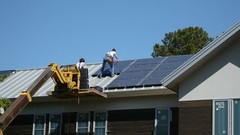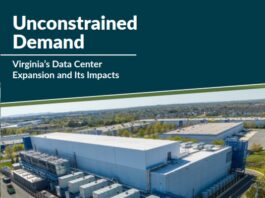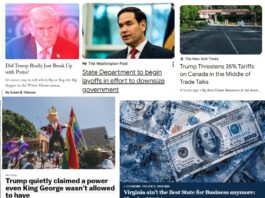 Solar energy is one of the fastest-growing industries in the country. Solar PV installations grew 109% in 2011, and the industry now employs over 100,000 Americans. Yet it is almost invisible in Virginia. The installed total in the commonwealth is about 5 megawatts (MW), a pittance compared to the 1,200 MW in California and over 800 in New Jersey. Maryland and North Carolina each have more than ten times as much solar PV as we do.
Solar energy is one of the fastest-growing industries in the country. Solar PV installations grew 109% in 2011, and the industry now employs over 100,000 Americans. Yet it is almost invisible in Virginia. The installed total in the commonwealth is about 5 megawatts (MW), a pittance compared to the 1,200 MW in California and over 800 in New Jersey. Maryland and North Carolina each have more than ten times as much solar PV as we do.
Part of the reason is our lack of incentives. Unlike many other states in the northeast and mid-Atlantic, Virginia offers no tax credits or rebates on solar systems to supplement the federal tax credit. And our voluntary renewable portfolio standard is so flabby that our utilities will never need solar to meet it.
Virginia also isn’t known for getting out ahead of the curve on energy. Instead of embracing the promise of clean power, the state clings to an old energy model dominated by fossil fuels. Just this year, the General Assembly renewed a subsidy that takes about $45 million every year out of the pockets of taxpayers to support coal mining.
But as a recent article in the New York Times Magazine described, the future has come knocking.
With the price of solar energy tumbling, solar now makes economic sense across much of the country. New financing models make it possible to install solar with no upfront capital cost to the customer, who may see immediate savings over grid-delivered “brown” energy.
Among these new models, leases have become especially popular for homeowners and businesses, but only power purchase agreements (PPAs) allow non-profits to take advantage of tax credits. Under a PPA, the solar installer retains ownership of the solar system and uses the tax credits to offset profits, passing along the savings as it sells the power to the nonprofit.
PPAs could permit the solar market in Virginia to blossom in a big way. Colleges and universities, private schools, churches, charities and local governments are now looking at solar systems as a way to meet carbon-reduction targets and reduce energy costs over the long haul.
Unfortunately, this new enthusiasm has run headlong into the immovable force known as Dominion Power. Dominion blocked a PPA at Washington & Lee University last fall, and its threat of legal action has kept other non-profits from moving forward with plans for solar installations.
Dominion is a regulated monopoly in Virginia, a status that gives it the sole right to sell power in its territory, with a few exceptions. One of the exceptions gives sellers of 100% renewable electricity the right to sell to Dominion’s customers if the company itself doesn’t offer that option-which, indisputably, it does not. (Its Green Power Program relies on certificates, not actual green electricity.)
So Dominion’s interpretation of the statute appears to be wrong on its face, but one of the nice things about being a giant monopoly is that you have more lawyers and more money than the people you threaten.
Unable to fund a lawsuit, the solar industry tried last year to get relief from the General Assembly in the form of HB 129, a bill that would have made explicit the right of renewable energy companies to sell power to their customers through PPAs. Delegate Jerry Kilgore (R-Gate City) shepherded the bill through the House, where it passed without a single dissenting vote. Once in the Senate, though, it was “carried over” (effectively, killed) by a Senate committee stacked with Dominion allies like Dick Saslaw (D-Fairfax) and Chairman John Watkins (R-Midlothian).
Quick quiz, but not a toughie: according to the Virginia Public Access Project, who is the top donor to the campaign chests of Dick Saslaw and John Watkins?
The failure of HB 129 leaves a lot of would-be solar and wind customers in limbo, keeps Virginia companies from growing and adding jobs, and prevents churches, colleges and universities from benefiting from the federal tax credits that are available to residents of other states where PPAs are common.
It has also given Dominion a black eye with the public and local officials. Critics say the heavy-handed effort to squash small solar companies shows the utility giant has grown overly complacent about its status as the most powerful force in Richmond.
Dominion should back down from its unreasonable opposition to PPAs. It has little to lose by allowing private companies the space to compete and innovate in a market Dominion itself doesn’t serve. And if it won’t back off, then the public needs to remind its legislators who they serve. Hint: it’s not supposed to be Dominion.



